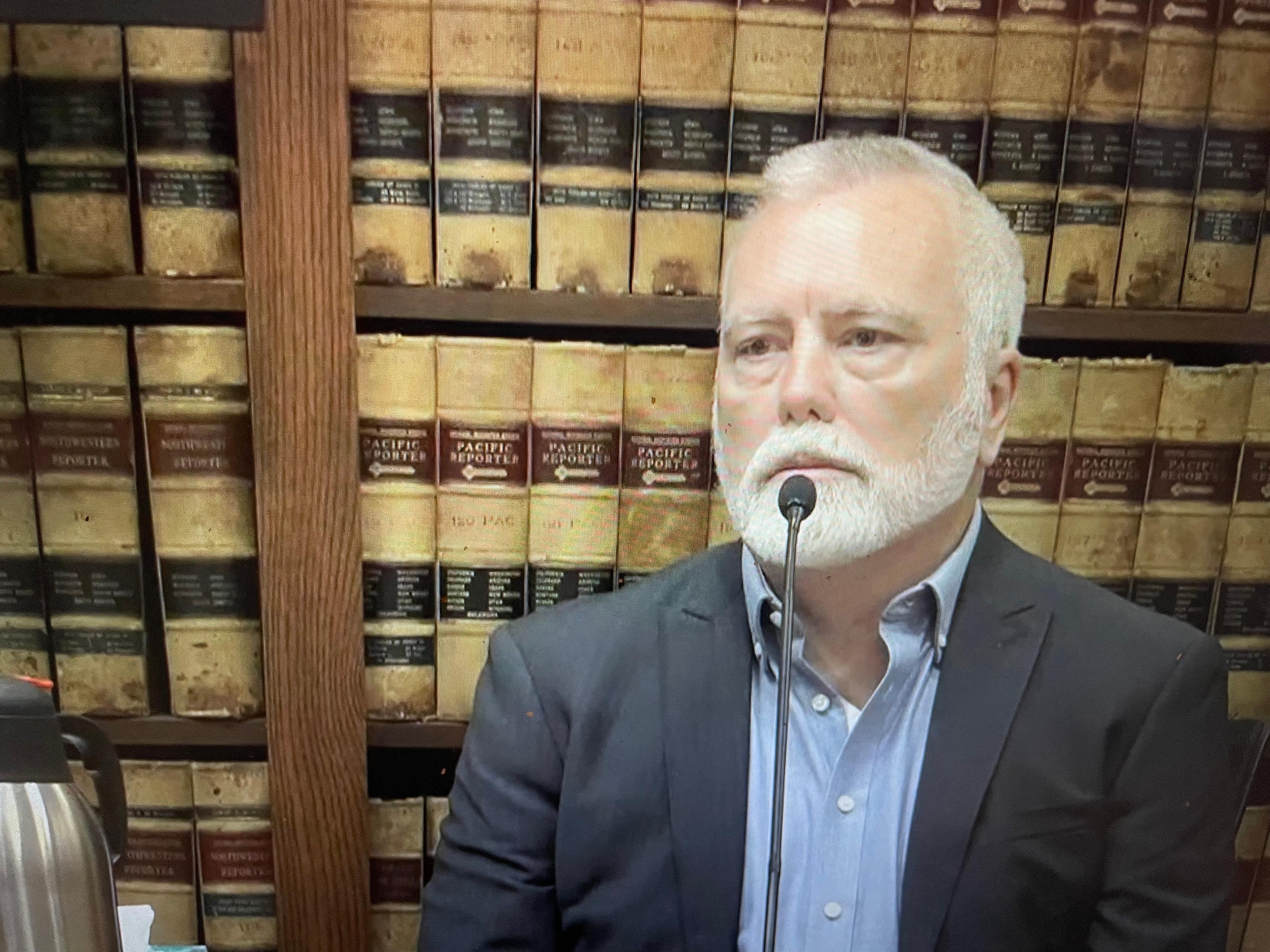
CPR is covering each day of the Peters' trial. You can read our explainer of the case here, and catch up on past days here.
The man at the center of the case against former Mesa county clerk Tina Peters took the witness stand on the third day of her trial.
Peters is accused of stealing the identity of Gerald Wood, a local Grand Junction area resident who works in IT, in order to let a different person attend a secure software update of her county’s voting machines in May, 2021.
Passwords for the machines and a video of the update were leaked online and copies of their hard drives have been used by people who doubt the accuracy of the 2020 election to hunt for evidence of fraud.
On Friday afternoon the prosecution walked Wood through his interactions with Peters and her office. He testified that he first was connected to Peters through a local conservative group called Stand for the Constitution; when Sherronna Bishop, a political figure who has been very active in the movement to question the 2020 election, asked to pass along his information to the clerk.
Wood said he was interested because “I’ve always been open to doing a little bit of consulting work.”
He said he talked with Peters on the phone in May of 2021, a few weeks before the county was scheduled to meet with the state and Dominion Voting Systems to update the machines’ software.
“She had expressed that she was interested in doing a backup of the election systems and I don't know the exact words, but she was concerned that there was going to be some manipulation and wanted to preserve data,” said Wood.
He wasn’t familiar with election equipment and normally works on software that’s used by alarm systems like ADT. But Wood still agreed to come to the clerk’s office to discuss potential contract work.
He said prior to his in person meeting he went through a background check and was issued a badge from the county’s Human Resources office with his name and picture on it. Peters’ deputy Belinda Knisley then asked him to come to the clerk’s office to meet in person with her and Peters.
“Mostly it was Tina and Belinda talking about how they need people they can trust, they need someone who's reliable with integrity and the importance of election integrity on the systems and the process,” he testified.
Wood said that while Peters mentioned that Dominion Voting Systems and the state would soon be updating the machines, she didn’t explicitly ask him to participate.
“I took it as they were interested in exploring it and were still figuring out whether they wanted to.”
After Peters had left the meeting, Knisley asked Wood for his badge.
“She said (it was) because I am not an employee of the county and we can't have people running around with employee badges looking like an employee, having access to things that she wanted the badge back,” Wood said. ”And so I handed it to her.”
Wood testified that he never directly communicated with Peters, Knisley or Bishop about any potential work.
However, records show Peters told the Secretary of State’s office that an employee of her office named Gerald Wood would attend the update. And people who were there have told investigators Peters was accompanied by someone she introduced by that name, who she claimed was a new hire learning the ropes. Prosecutors believe that man was in fact Conan Hayes, a California-based proponent of theories that the 2020 election was stolen.
Wood said after his meeting at the clerk’s office he didn’t hear anything more about the software update, the ID badge or anything else connected to consulting with the Mesa County elections office.
Everything changed the week of August 9th, 2021, when Wood was attending a “cybersecurity symposium” at which the CEO of MyPillow Mike Lindell had promised to reveal proof of massive election fraud. That’s when news broke of the election equipment breach in Mesa County, and Wood said it was odd to find himself in the middle of it.
“Our Secretary of State, Jena Griswold, held a news conference talking about the horrible things that were happening in Mesa County and mentioned my name... I became national news at that point,” said Wood.
He said that initially he figured his ID badge had been found in a drawer in the election’s office and that the whole thing was some sort of government set-up since he felt Griswold, a Democrat, was pointing the finger at him without investigators having all the facts.
Describing his reaction, Wood said, “anger was starting to build up, (along with) a little bit of anticipation, a lot of questions.”
He said he immediately worried about potential criminal or civil consequences and what it would mean for his family and started asking around at the conference for recommendations for legal representation.
During the cross examination, Peters’ defense questioned Wood’s assertion that he didn’t communicate with Peters and Bishop during that summer of 2021. Defense attorney John Case also asked if Wood was certain that he didn’t give anyone permission to use his ID badge.
“You did not know anything about the plan to use your key card to bring in Conan Hayes?”
“I did not,” Wood responded.
The defense asked Wood to recall a group text conversation he had on the secure messaging app Signal which also included Bishop and Peters. The group chat was named Tech Team and Wood used the handle name Trebuchet, which is a type of artillery used in medieval warfare, which he confirmed was associated with his cell phone number at the time.
Wood said that while he has used that name, he couldn’t remember if that was his Signal handle. And when presented with printed out chat messages on the witness stand he said he couldn’t recall the chat.
“I can't say it refreshes my recollection, but it looks like a text thread that I was on,” said Wood.
Case drew Wood’s attention to a message from Bishop that read, ”‘Tina, this is our guy.’
However the defense couldn’t continue this line of questioning. The judge upheld an objection from the prosecution because Wood hadn’t authenticated the communication and the messages hadn’t been formally introduced into evidence.
“You're completely innocent of what happened in Mesa County?” asked Case.
“Yes I believe I am,” Wood responded.
However, Case noted that Wood sought immunity before testifying to the grand jury that brought charges against Peters. The defense also questioned why he didn’t immediately get in touch with the lead investigator on the case.
“So you had his number, you knew he was looking for you and you knew you were completely innocent. True?
“Yes.”
“Did you call him?”
“I did not,” Wood admitted.
Wood’s testimony ended with a strange legal mini drama.
Case said he wanted to bring Wood back to the stand later in the trial to continue answering questions, after an upcoming witness authenticates the Signal messages.
But because the prosecution subpoenaed Wood, not the defense, Peters’ side lacks the power to compel him to return to the stand. There was some confusion when the defense attorney, Case, then attempted to serve Wood with a subpoena in the courtroom, as the prosecution objected.
Wood walked past the defense as he left the witness stand, and as the paper subpoena brushed against him, he didn’t take it.
- Tina Peters Trial Day 1 — Attorneys deliver contrasting narratives of former Mesa County Clerk’s handling of election equipment
- Tina Peters Trial Day 2 — The former Mesa County Clerk heard blasting the Secretary of State’s Office in recording
- Three years after being accused of tampering with voting machines, former Mesa County Clerk Tina Peters heads to trial
- Potential jurors screened ahead of former Mesa Clerk Tina Peters’ election security breach trial









